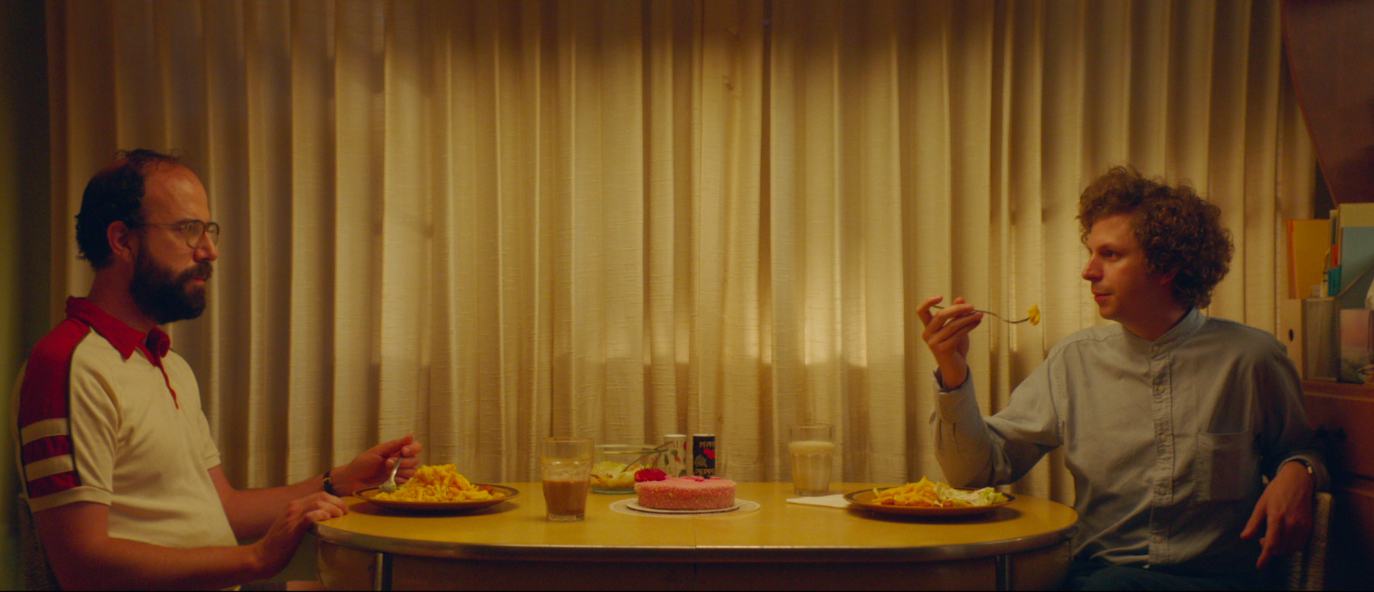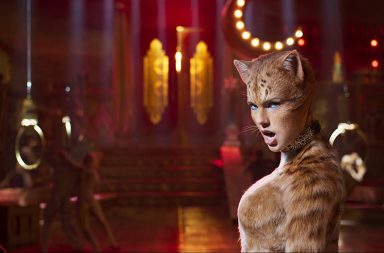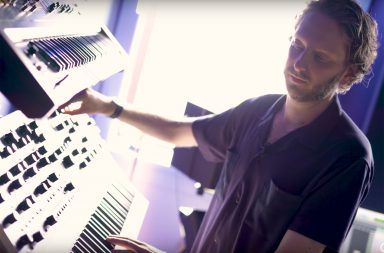The relationship between Janicza Bravo and Heather Christian has been, in Christian’s own words, a “life-long love affair” that started long before Bravo directed her first short films. So when the Los Angeles director gave her fetish composer Lemon, not only did she turn it into lemonade, but she managed to quench the thirst for eccentricity for anyone curious enough to listen to it. Christian, besides being a multitalented musician and composer, is very busy as well, so much that we came to believe that either she has a doppelgänger, or she used a time-freezing power to talk to us. Anyway, the Lemon composer deserves a much wider recognition than what she actually gets for her numerous projects: she is the singer/songwriter in the band Heather Christian & the Arbonauts, wrote and composed music for many off-Broadway stage plays – she recently created her own one-woman musical called Animal Wisdom, which played for two months in Brooklyn and received great reviews – and, of course, writes music for film. Lemon marks the first time the New York composer scores a feature-length film – the first feature director by her longtime friend Janicza Bravo – and talked to Score It Magazine about her compositions.
A genuine cinematic curiosity, Lemon is a surreal and absurd tale of mid-life crisis which follows the unraveling life of stage director Isaac (Brett Gelman), who is left by his girlfriend of ten years (Judy Greer). Heather Christian wrote, produced and arranged all the tracks from the soundtrack album which is odd, pretty much like the film, and includes, among other unexpected tunes, a grand oratorio beautifully sung by choir voices which is the core of the film’s musical dimension.
How did you meet Janicza Bravo and how did you end up composing music for her films?
Janicza and I met in college, where we went to the same theatre program and she was a theatre director. She was sort of famous for doing these highly stylized productions that were absolutely gorgeous. I started as an actor in some of her plays, then she decided to add music to a production of Romeo and Juliet that she was doing in a church in Downtown New York and she was like, “I need a composer, so why don’t you write something?” I had never composed anything at the time… I mean, I’ve been a musician for forever, but I had never written for theatre. So I said, “Okay, I’ll try!” I wrote a score for voice and typewriter, and I played the apothecary in this production. (laughs) Later, she moved to Los Angeles and decided that film was where she really wanted to focus her attention, and she gave me a similar phonecall, which was basically, “Hi, I need a composer” and I was like, “Great, I don’t know what I’m doing.” That’s how we made our first film together, and through that process, I thought, “Oh, I might actually have something to say here.” We both have a theatrical approach to film work that I think is different, but we’ve been in a life-long love affair, Janicza and I, so in any film that she decides to undertake, I usually end up doing the score.
Lemon, even though it is a small-budget independent film, is a bigger production than Janicza’s short films. Did you two worked as close as you did on her previous films?
Well, because she is on the West Coast and I live on the East Coast, most of our work is done long distance, so my relationship with Janicza is on the phone or via Skype during the entirety of the process. I only met her crew once, I was on the set for one day, and I didn’t meet her editor until after we were done with the film. It’s mostly Janicza that I’m just talking to, so I feel like I have a very insular relationship with her, which is so wonderful! As a result, the score feels like it is entirely her voice.
What directions did she give you for the score?
I went in three directions. First, I wrote this vocal oratorio based on Chekhov’s The Seagull, which is the play that Isaac, Brett Gelman’s character, teaches to his class in a terrible production. Then, I did this sort of deconstructed vaudeville score for solo instruments, and finally, I made this bad radio station that could play in Isaac’s nightmares, which was all songs that could be from a very specific artist, but all of the lyrics were taken from Victorian poems about birds. So, I sent Janicza these three directions, expecting her to pick one, and she said, “We’re gonna do all three!” We approached the score in a theatrical way, because she split the movie up in acts, like you would do with a theatre play. In the short films that we do, she would sometimes come up to me with a seed idea, like, “I think this is all flute music” or, “I think this is heavy metal.” In the case of Lemon, she said, “I do think there’s a large orchestral piece, but I just want you to do what you want to do on this one.” It was totally liberating.
The three ideas you mentioned before – the oratorio, this piano/clarinet duet which has this silent film music flavor and the indie pop song – are basically three themes that are far from traditional film scoring. How did you come up with these?
As a composer, I’m not good at straight up underscore. I’m always looking for something that I can be in dialogue with. I feel, especially in Janicza’s work, like there’s so much visual content: she’s so meticulous about frame, and about colour palette, and everything in that room has been styled, and every single shot… There is no real missing information, we’re getting everything, so I wanted to make a score that was autonomous, or music that was in dialogue with Isaac. In order to do that, I can’t just write what I think feels like this, so I do a thinking exercise. The first thing I knew I wanted to do was the vocal oratorio for The Seagull. That was more of a wouldn’t-that-be-cool! idea, actually. (laughs) I wondered if that would be too much, but too much is absolutely enough in this case. The emotional trajectory of the film mimics the emotional trajectory of The Seagull; the movie is actually pretty Chekhovian, in that it is like a glorification of mundane crises. Thematically, it made sense, but I had no idea how it would work in the film. Then, Janicza was actually the one who said, “I need something that is a little more light,” and that’s how I came up with the vaudeville piece, which was quite a lot of fun. I love diegetic… Well, I love diegetic anything in films. What diegetic score is, first, like what underscore is, but by breaking the reality just a little bit. So, the radio station, because Isaac spends so much time in his car, felt like a good way to do that.
The relationship between the film and the play within the film has a weirdness to it in which music plays a large role. Though I saw Lemon as something mainly satirical, your music reaches out for much more abstract and intimate feelings such as sadness, loneliness, but also grace, all of which are emphazised in a grand way. How did you work on this in the composing process?
What I like to do is oversaturate. I like to make what I call “suites,” and for Lemon we ended up using something like 170 cues… Usually, what I do is make a lot. I have a singular relationship with Janicza in which she never uses a temp score, I never feel like I’m having to replace anything so I start writing very early in the process and I send her all of these libraries that she can use as a temp, and then we solidify which of these demos are working for her. So I take those and Frankenstein them – I mean, I call musicians, we make them what they should be in order to turn them into bona fide pieces of music and not just thoughts or ideas. It’s very much a back-and-forth process, I send her a lot of stems and I trust her and, implicitly, her editor, to place things.
What you have composed for Janicza Bravo’s films is very different each time, and it led me into thinking that she gives you a lot of freedom and that it is you, as a composer, who is just willing to explore this musical genre or that one.
Well, I am sort of a musical omnivore. I grew up classically-trained in piano but I sang in blues clubs, and there’s a lot of stuff in between these two, so I just made it my job to consume everything. Where my inspiration lies is trying something that I don’t know how to do. In Man Rots from the Head… I, by no means, am a jazz music expert. However, as an idiot approaching jazz, I do feel that the score has a certain commentary about it; if it was totally 100% within its own genre, I don’t think it would have a point of view. It’s this musical education process that I’m going through while I’m attempting to execute – or whatever it is that I’m doing – that lends a sort of fucked up comedic air that works well with Janicza’s aesthetics, in that she’s always an outsider, and the viewer is always an outsider, and the protagonists are always outsiders. So I think that’s more serendipity that those things are laying, specifically with Janicza’s films, but the inspiration is usually in the seed of “How do I do this?” like, “How do I write a score entirely for the flute?” or “How do I do heavy metal?” No idea how to do heavy metal! What’s the deal with heavy metal? So you usually do the research of why it’s valuable to come up with, but people attach themselves to specific genres of music and all of that becomes part of the thinking exercise.
It sounds like you need challenges.
I do! Music is an abstract art form, you know. I feel like the majority of generation, for me, is in process. It’s tricking my brain into thinking that I’m doing something very specific because otherwise, the possibilities are endless. So I just have to make a decision right off the bat that this is the approach that I’m going to take, these are the parameters that I’m going to set, and then just go into it. And usually, what I end up with is something completely different, but the parameters are where most of the contact comes from, at least in this generation phase.
When one has so many different projects such as you do, how important is it to have an entourage? I mean, do you work regularly with the same musicians, no matter what the project is?
Well, yes and no. If I have a longer timeline, I really do try to make the effort to meet different musicians and work with them if I’m sure that it is going to work. But I’ve got people in my Rolodex who will remain there for life; my guitarist Sasha Brown and I have been together for over ten years, and he’s always the first phone call that I make; my score mixer and record producer Brian Bender is someone with who I will probably work with for the rest of my life. Just because there’s an easy report in these two very important areas, it gives me more freedom to pick from a wider pool of musicians that I’ve not necessarily worked with before; I know that with Sasha, somebody is going to get an arrangement and add exactly the right flavour that I wanted to the mix, and I know that I’m going to pass it off to a mixer and producer that knows exactly what I’m going for, so I don’t have to worry about those things. I think it’s important to work outside your circle, absolutely, but… You’re not dealing with a musician who’s just going to play your part, you work with someone who has an entirely different perspective, which I love and encourage because it does interesting things to my brain and takes me to the next step, so I’m constantly trying to find people who are smarter than me.
What directions did you take in choosing the instruments?
It was sort of a grab bag. Lemon was made on a shoestring budget, so I had to fake an orchestra. I knew that I needed these giant choral pieces and I knew that I was going to need instruments that I couldn’t fake. There’s a lot of instruments that I can fake, but I can’t fake a French horn, I can’t fake a bassoon, I can’t fake a clarinet. So it really became about who; it was less about the timbre of the instrument and more about the instrument that I was going to call over to my studio and spend twenty-four hours with. The first who I had identified was Patrick Breiner, who is primarily a saxophone player; he brought in everything that he could play, and we ended up using some clarinet. I just took everything and I figured out where to go from there, the way that the instruments get personified for me in different ways and different contexts. Then, I figured the counter to that, the aspect of Isaac’s personality, that was not in the score yet, and it was this element of cheesy pomposity. And I was like, “Well, what’s cheesier and more pompous than a French horn?” (laughs) So, I called Matt Marks, who is a friend of my husband, to come over and do some French horn for me. I feel that it’s those two elements that really shaped where everything else went. About the choral stuff, the first thing I identified was a choral writer, so all the choral things sort of have their own identity. It’s hard for me not to use my voice as a choral writer – there’s quite a lot to say in that regard – so I just started fooling around with strings. I can play key things, so pipe organ felt like too much, and in this case again, too much was just enough. I tried a lot of directions before I solidified exactly where we were going, but a lot of it started with Patrick being exactly the right voice.
Is there something that you still have not experienced in music and that you want to try? Or maybe some future projects in film scoring?
You mean “nothing that I can talk about?” (laughs) Yeah, I’ve got several projects that are currently and unbelievably all in the contract phase right now, but soon, some of these things will become visible. I’m very excited about them, and I hope to be able to talk about them very soon. But honestly, I’d love to try to make a hip hop record! (laughs) That’s not something that I’ve tried before. I love form, I guess it’s part of my OCD… Recently, I wrote a requiem mass for a show I was doing, and, you know, the form is so ancient that you just have to trust it. All of the notes and where they’re supposed to go emotionally are already figured out. Classical form is something that I’m pretty much still investigating and in which I’m interested, in terms of what it does to my brain when I’m writing something. I’d love to write a suite – whatever that means for a musician like me! Eventually, I’d love to write a sonata for piano, even though I would never want my music to feel like it is rooted in one thing, entirely. Especially if I’m approaching things classically, I don’t ever want them to feel stodgy, I don’t want them to feel like you know you’re listening to classical music. I always want to be on the cusp of, you know, “How am I supposed to be listening to this?” There’s information like: how we feel in a rock club versus how we feel in Carnegie Hall… Well, I feel like I’m constantly trying to find the seat in between those two seats.
Interview prepared, conducted and transcribed by Valentin Maniglia
Edited by Marine Wong Kwok Chuen



